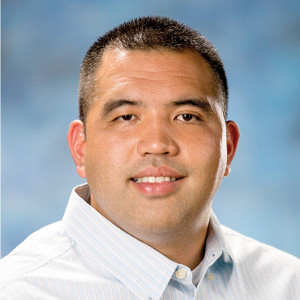By Amanda Pampuro
 “I don’t sound like a finance guy, do I?” asks Joseph Shinohara, vice president of finance and controller for GTA. Between unadorned white walls and beige filing cabinets, two 24-inch computer monitors and a laptop, his office looks ordinary enough, but with a gregarious personality and an appreciation for complex problems, Shinohara is more than your average number cruncher.
“I don’t sound like a finance guy, do I?” asks Joseph Shinohara, vice president of finance and controller for GTA. Between unadorned white walls and beige filing cabinets, two 24-inch computer monitors and a laptop, his office looks ordinary enough, but with a gregarious personality and an appreciation for complex problems, Shinohara is more than your average number cruncher.
Shinohara says the modern finance professional “is no longer just a processor or bookkeeper but needs to be an all-around forward-thinking contributor to the organization. In an industry driven by metrics, it is important to understand all facets of the business. You need to have the accounting foundation, but you also need to be a risk manager, analyst, planner, strategist and decision maker.”
Shinohara first entered the doors of GTA more than a decade ago, as an auditor under Ernst & Young LLP. In May 2007, when the government agency was privatized, Shinohara was brought on board as the revenue assurance manager. Having worked his way up to vice president of finance, most recently adding the role of controller to his business card, Shinohara is responsible for the development and analysis of financial and marketing business metrics and planning.
“I’ve had the privilege of having a front-row seat to the company’s transformation from a government-owned agency, restricted from competing, to a successful private market leader in the telecom industry,” Shinohara says. Under the government of Guam, GTA was primarily concerned with providing utility and maintaining landline service, but in the private sector, GTA has had to progress, expand services, improve quality assurance and develop a customer service department.
“Private equity is … results driven and steadfast on the performance of the company. … We have become the innovators; it seems like we were the first to bring in everything new,” says Shinohara, crediting GTA as the first company on island to provide Blackberry, IPTV and the iPhone. Over the last two years, the small company has doubled in size, now employing close to 500 personnel and attracting a number of investors.
“I love the challenge of having something new every day. There is always something new,” Shinohara says, adding that while his job grows more demanding by the day, he couldn’t have done it alone. “I am blessed with such a loving and supportive wife, Angelica. She has been my biggest supporter and continues to hold down the fort at home as well as being a working mom.”
“I had my first son when I was a senior in high school, and that was really my driving power to succeed,” he says. To Shinohara that meant working that much harder to ensure security for his new family. He subsequently graduated top of his high school class, then graduated summa cum laude at the University of Guam and passed his CPA test on the first go.
Now a father of four sons — Joseph, 17; Mason, 10; Zion, 7; and 1-year-old Cooper — Shinohara does his best to be a good role model. When Joseph Jr. played football for Father Dueñas Memorial High School, Shinohara returned to his alumni team, helping to coach the Friars in their last undefeated season.
The former offensive player continues to look at his career as a game that requires equal balance of aggression and strategy. “We have to get away from the stereotype of analytics — that accountants are number crunchers and pencil pushers. We provide the data for making future decisions. If you’re the kind of person who just gives the numbers, you won’t make it in this field. You have to go beyond the books and be able to strategize.”
Today, the finance department leads the way for network improvement and product selection, relying largely on user data to decide what products and services would best enhance the customer experience. With 90% of its customers on iPhones and Androids — including the Shinohara family of six — GTA has invested $20 million in the expansion of its fiber optic network to keep up with the island’s demand for smartphone data.
“I can see a shift towards big data analytics, which involves examining market trends, customer preferences and other useful business information. The findings can lead to more effective marketing, new revenue opportunities, better customer service and improved operational efficiency, which I believe is key to any successful business.”













